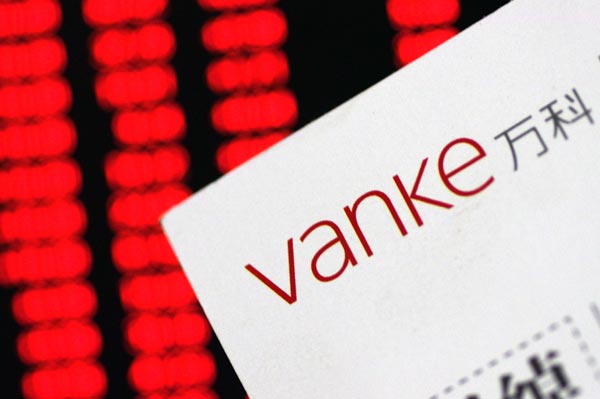 |
|
Vanke's net profits in the first half of 2016 rose 10.4 percent to reach 5.35 billion yuan ($808 million), notably lower than the 28.1 percent growth in the first quarter of the year. [Photo/VCG] |
BEIJING - China Vanke Co Ltd, the country's leading property developer, reported decent net profits in the first half of this year while admitting that the heated takeover battle has hit its normal operation.
The prolonged tussle over control of Vanke "has not been resolved satisfactorily up until now," according to a statement the company filed to the Shenzhen Stock Exchange on Sunday.
The current management will strive to stabilize operation but it cannot rule out the possibility of future results being affected by the takeover battle, the Shenzhen-listed developer said in the statement.
Profits up
Vanke's net profits in the first half of 2016 rose 10.4 percent to reach 5.35 billion yuan ($808 million), notably lower than the 28.1 percent growth in the first quarter of the year.
The company's operating revenue soared 48.8 percent to 74.8 billion yuan, lower than the 64.3 percent rise reported in the first quarter of the year.
"The growth in profit was slower than that in operating revenue, as certain projects booked during the period were sold during the property market adjustment in 2014," Vanke said in the statement.
Vanke's sales of residential property, in terms of floor space, soared 55.8 percent to 14.1 million square meters in the first half of 2016. In revenue terms, Vanke's sales of residential property jumped nearly 70 percent to 190.1 billion yuan.
The Shenzhen-based developer said China's property market registered satisfactory sales in the first half of 2016.
Since the second half of 2014, sales of residential property in medium- and large-sized cities have rebounded, showing increases for 20 months in a row. The recovery in transaction numbers has continued for 15 months.
According to the National Bureau of Statistics, sales of residential property in China, in terms of floor space, rose 28.6 percent year on year to 570 million square meters in the first half of 2016. In revenue terms, sales of residential property jumped 44.4 percent to 4.2 trillion yuan.
Control war continues
At present, the turf war between Vanke's shareholders and management has "already caused negative impacts on the normal operation," Vanke said in the statement.
The heated war over Vanke's control kicked off last September, when privately-owned Baoneng's sudden and massive buying of shares triggered a suspension of the company's shares on the stock market. Vanke chairman Wang Shi openly opposed the acquisition shortly afterwards.
The turf war between shareholders and management escalated last month, when Vanke announced an asset restructuring plan worth 45.6 billion yuan with Shenzhen Metro Group that would make the subway operator overtake Baoneng to become the biggest shareholder.
In response, Baoneng proposed ejecting Vanke's senior management team, including Wang Shi, who is also founder of the company. But the proposal was voted down by the board later.
Vanke is currently China's largest property developer by sales revenue, while Baoneng, headquartered in the same city, is a conglomerate with real estate and finance businesses.
"Since the end of June, the (Vanke) Group's partners, customers, employees and other minority shareholders have greater doubts and worries about the company's future prospects," Vanke said.
According to the statement, the impacts on the normal operation included the acquisition of new land projects, less confidence of partners and customers, Vanke's business expansion and rocked team stability.
Vanke's management promised to do its best to eliminate interference and stabilize the team.
It will also strengthen mutual trust of shareholders and minimize the effect of the takeover battle on the company's operation, even though it is still extremely difficult because of the situation, it said.
Vanke also said no consensus has been reached on the controversial asset restructuring plan, which was rejected by major shareholders, including Baoneng.
The management hoped that relevant parties will overcome their differences and reach consensus to seek an appropriate solution to lead Vanke back on track of normal development and strive for the best interest for all shareholders, the statement added.
